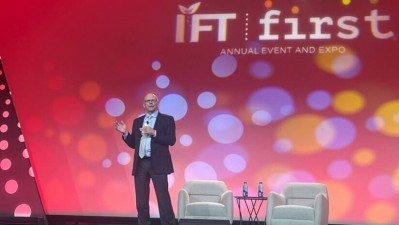IFT FIRST 2024
Public funding for food research: A challenge and opportunity for the food industry

IFT FIRST in Chicago last week.
Despite its importance for health, funding for food research in the US appears to be lacking, said Matt Teegarden, research strategy and development lead at Ohio State University. While federal agencies like USDA and National Science Foundation (NSF) provide some support, the funding for crucial areas like food production, safety and quality seems stagnant or low, hovering around “$10 million a year,” he said.
Even the National Institute of Health, with its $2 billion dedicated to nutrition research, allocates only a small portion (4-5%) of its total budget, Teegarden explained. He emphasized the difficulty in comparing funding across different agencies due to their varying program structures. This fragmentation, coupled with what seems like overall low funding levels, leads for a larger conversation about how to better support food research, possibly through a more collaborative, interdisciplinary approach.
Limited private sector investment
While the private sector is thought to fill in the gaps missed from public funding, it is “not what we are actually seeing,” said Anna Rosales, senior director of government affairs and nutrition, IFT.
“When you work for a food company, you tend to research to a very specific end. You have a specific claim or something that you wanted to do and it is not the same kind of basic or broad research that we need, but in food science and not to mention with some of the distrust … in private research or in companies, it is really hard for them to invest in research in the same way that maybe they would have 15-20 years ago,” she said.
Rosales added that “there is a hesitancy sometimes for different organizations to invest in research because of perceived conflict of interest.”
Universities: bureaucracy vs. collaboration
While universities play a vital role in food science research, internal structures and incentives can sometimes create hurdles for collaboration between different departments. This can hinder the development of interdisciplinary research projects that bridge the gaps between agriculture, food science and nutrition.
As Teegarden further pointed out, "there are different incentives. Depending on where you sit in the university for research and the different size of the grants and whether or not your college can accept funding from this agency.”
Opportunities for the food industry
Despite the challenges, there are opportunities for the CPG food industry to engage in and benefit from food research advancements.
New funding mechanisms like Advanced Research Projects Agency for Health (ARPA-H) encourage collaboration across disciplines. Additionally, platforms like IFT Connect can facilitate networking and collaboration among researchers from various fields, Rosales added. By participating in these initiatives, food and beverage companies can gain access to a wider range of expertise and perspectives.
Programs like the Foundation for Food and Agricultural Research (FFAR) offer matching grants that connect industry with research efforts to address their needs while mitigating conflict of interest concerns. Food and beverage companies can leverage these programs to co-fund research projects that align with their strategic goals and contribute to broader industry advancements.
Organizations like IFT advocate for increased public funding for food research programs like USDA’s Agriculture and Food Research Initiative (AFRI). Food and beverage companies can support these efforts by engaging with IFT and policymakers, Rosales said. She emphasized the importance of advocacy, stating, "We are always advocating for full funding of AFRI programs … [who] are authorized for $700 million.”










